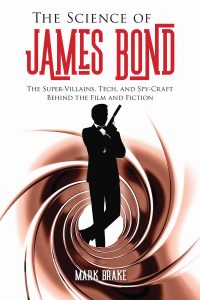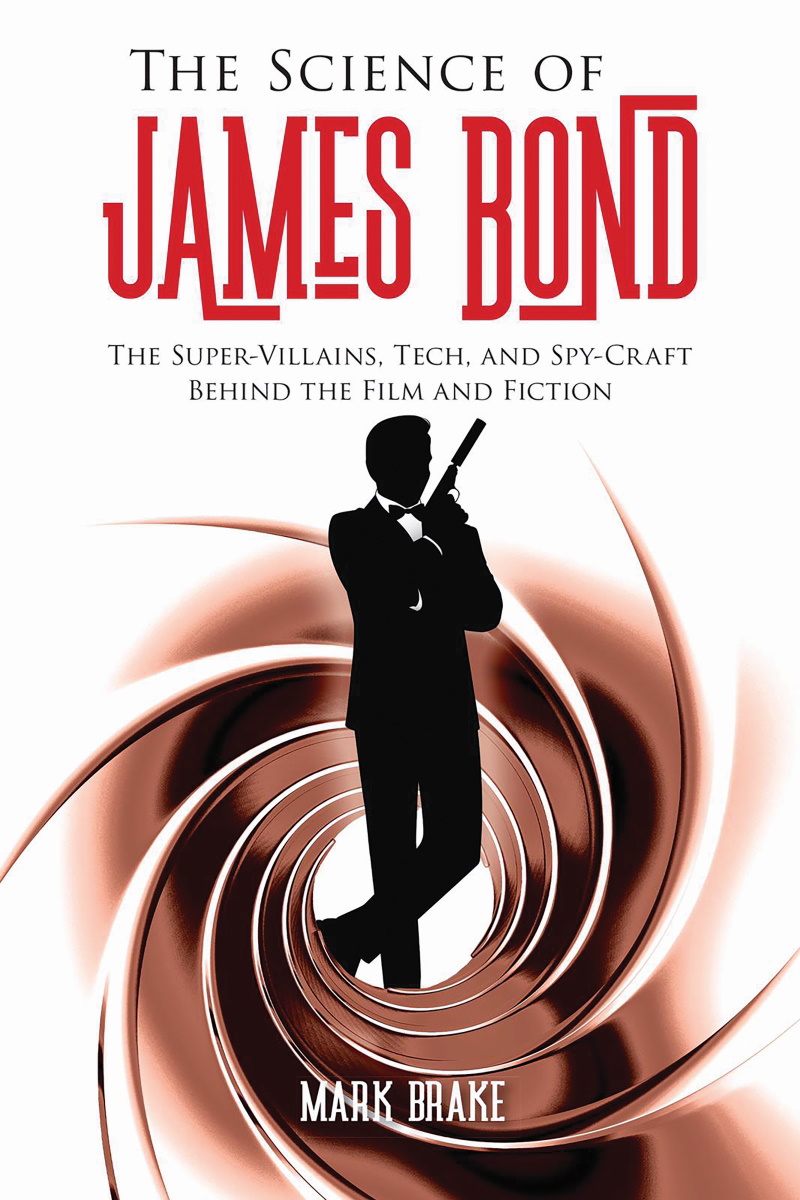The Science of James Bond
Mark Brake, author of The Science of James Bond, explains why boffins, maniacs and jetpacks make the James Bond spy-fi films the highest-grossing franchise of all time – over and above Harry Potter and Jurassic Park
IN YOUR BOOK THE SCIENCE OF JAMES BOND, YOU WRITE THAT JAMES BOND IS THE HIGHEST-GROSSING MOVIE FRANCHISE OF ALL TIME. WHY DO YOU THINK JAMES BOND IS SO SUCCESSFUL?
James Bond is the only international secret agent with a shelf life of almost 60 years. The genre of spy fiction grew a lot after WWII, during the so-called Cold War, when the world was split between the power Blocs of East and West. Like us, Bond lives in a changing world. He’s a lone-wolf trying to save a chaotic world from itself. But the secret to Bond’s success is that it’s spy fiction with a twist. James Bond movies fuse spy fiction with science fiction, reflecting sci-fi’s obsessions with super-villains, the future and world domination or destruction, along with plenty of entertaining gadgets, inventions and spy devices.
WHAT WOULD YOU SAY IS THE RATIO OF SCIENCE FICTION TO SCIENTIFIC FACT IN THE JAMES BOND FILMS?
The fiction and fact are fused together in each film. You can see the way the themes change from movie to movie, following Bond’s progress whilst also looking at the bigger picture of science and tech in each plot. There’s an exploration of space in Dr No, You Only Live Twice, Moonraker and GoldenEye. The films For Your Eyes Only and Octopussy focus on a world that is suffering from nuclear paranoia. And the movies Skyfall and Spectre look to a worrying future world where almost everyone is being spied upon using the intrusive technology of spy-craft.
CHAPTER ONE OF YOUR BOOK STARTS WITH A QUOTE FROM THE VILLAIN DR NO: “ALL THE GREATEST MEN ARE MANIACS. THEY ARE POSSESSED BY A MANIA WHICH DRIVES THEM FORWARD TOWARD THEIR GOAL. THE GREAT SCIENTISTS, THE ARTISTS, THE PHILOSOPHERS, THE RELIGIOUS LEADERS—ALL MANIACS.” DO YOU THINK THERE IS AN ELEMENT OF TRUTH IN THIS?
IN YOUR BOOK THE SCIENCE OF JAMES BOND, YOU WRITE THAT JAMES BOND IS THE HIGHEST-GROSSING MOVIE FRANCHISE OF ALL TIME. WHY DO YOU THINK JAMES BOND IS SO SUCCESSFUL?
James Bond is the only international secret agent with a shelf life of almost 60 years. The genre of spy fiction grew a lot after WWII, during the so-called Cold War, when the world was split between the power Blocs of East and West. Like us, Bond lives in a changing world. He’s a lone-wolf trying to save a chaotic world from itself. But the secret to Bond’s success is that it’s spy fiction with a twist. James Bond movies fuse spy fiction with science fiction, reflecting sci-fi’s obsessions with super-villains, the future and world domination or destruction, along with plenty of entertaining gadgets, inventions and spy devices.
WHAT WOULD YOU SAY IS THE RATIO OF SCIENCE FICTION TO SCIENTIFIC FACT IN THE JAMES BOND FILMS?
The fiction and fact are fused together in each film. You can see the way the themes change from movie to movie, following Bond’s progress whilst also looking at the bigger picture of science and tech in each plot. There’s an exploration of space in Dr No, You Only Live Twice, Moonraker and GoldenEye. The films For Your Eyes Only and Octopussy focus on a world that is suffering from nuclear paranoia. And the movies Skyfall and Spectre look to a worrying future world where almost everyone is being spied upon using the intrusive technology of spy-craft.
CHAPTER ONE OF YOUR BOOK STARTS WITH A QUOTE FROM THE VILLAIN DR NO: “ALL THE GREATEST MEN ARE MANIACS. THEY ARE POSSESSED BY A MANIA WHICH DRIVES THEM FORWARD TOWARD THEIR GOAL. THE GREAT SCIENTISTS, THE ARTISTS, THE PHILOSOPHERS, THE RELIGIOUS LEADERS—ALL MANIACS.” DO YOU THINK THERE IS AN ELEMENT OF TRUTH IN THIS?
American academic Camille Paglia says there are no female Mozarts. Genius, she argues, takes obsession, which produces good and bad talents, and skills. She thinks there are no female Mozarts because there are no female Jack the Rippers. I’m not so sure I believe in the idea of the lone-genius, working away in an isolated lab. There’s still a kind of ‘great men’ myth about science: the false idea that progress in science is due solely to the genius of great men, irrespective of factors such as culture, society and economy. We’re expected to believe that these masterminds just dream up stuff out of thin air. Many histories of science are rooted in the ‘great men’ myth. They are little more than a series of naïve narratives of great discoverers, each with their own momentous and revelatory insight into the secrets of nature. In truth, progress is the fruit of many ordinary thinkers and workers. Great men, and women, have been a crucial factor. But their contribution should be seen in context, and not in isolation from their contemporary setting. An inability to see this often leads to the use of redundant words like ‘brainwave’ or ‘genius’ to explain away those eureka moments of discovery.
YOU EXPLAIN THAT “THE WORD ‘BOFFIN’ IS AN INFORMAL NAME, MAINLY BRITISH, WHICH IS GIVEN TO SCIENTISTS WHO KNOW MUCH ABOUT SCIENCE BUT LITTLE ABOUT ORDINARY LIFE; THOSE THINGS THAT MAKE US MORE HUMAN.” DR NO IS A “GERMAN-CHINESE MALEVOLENT BOFFIN”; Q IS AN “ANTIQUATED OLD BOFFIN” WHO APPEARS IN MANY OF THE BOND FILMS; WHILE THE LATEST Q, APPEARING IN SKYFALL, IS “A BOFFIN OF THE MILLENNIAL KIND: ALL ANORAK, HEAVY RIMMED SPECS, AND COMPUTER ALGORITHMS”. WHY ARE SCIENTISTS OFTEN PORTRAYED AS BOFFINS? DO YOU THINK THIS IS DAMAGING STEREOTYPE?
You have to think carefully about the way in which film and fiction portray the scientist. Science has produced, among many wonderful things, the bomb, the cyborg and computer systems capable of killing millions. Many scientists – perhaps most of them – believe that these accusations have been laid unjustly at their doorstep. These monster inventions, they would say, are the sins of technology: sins of applied, not pure science. But movies are unhappy with this muddled division of labour. So, movie-makers conjure up doctors such as Faustus and Frankenstein, and Jekyll and Strangelove, as a warning that mad doctors of science DO exist and that such images still sit in the public’s imagination. Scientists are humans, capable of good and bad.
IN THE 1963 JAMES BOND FILM FROM RUSSIA WITH LOVE, THE SPECIAL EFFECTS CREW USED A MINI RADIO-CONTROLLED HELICOPTER INSTEAD OF A REAL ONE TO CREATE A TRUCK-VERSUS-HELICOPTER SHOOTOUT. DO YOU THINK ADVANCES IN SPECIAL EFFECTS TECHNOLOGY HAVE MADE THE JAMES BOND FILMS BETTER OVER THE YEARS?
Not necessarily. The relationship between special effects technology and movie plot is not that formulaic or mechanical. For example, almost 20 years ago, they put a lot of money into the CGI of Die Another Day. But with the video game James Bond bleeding out into cinema, the CGI-heavy Die Another Day had past the tipping point from espionage into comic book spectacle and excess. Bond became too unbelievable. And it took the grittier Daniel Craig, who really does look like he could kill you if he wanted to, to make Bond more believable again.
YOU ARE A SPECIALIST IN SCIENCE COMMUNICATION. WHY IS SCIENCE COMMUNICATION IMPORTANT?
The psychoanalyst Erik Erikson once said, “[humans] need to teach, not only for the sake of those who need to be taught, and not only for the fulfilment of [their] identity, but because facts are kept alive by being told, logic by being demonstrated, truth by being professed.” Erikson called humans the ‘Teaching Species’, writing that a need to teach and help others grow is at the very centre of a human adult’s identity. Our investment in those around us, in the form of science mentoring, is essential if we are to develop a healthy and supportive community, in a communal or global context.
WHAT DID YOU WANT TO BE WHEN YOU WERE YOUNGER?
My idea of what I wanted to be changed over time. Punk was big when I was young, so I set up a punk band and thought about a future in music. Times change, and your aspirations change too. I eventually got into science communication because I was passionate about the fascinating relationship between science and sci-fi, and I wanted to talk to people about this relationship.
WOULD YOU RECOMMEND A CAREER IN SCIENCE COMMUNICATION?
It’s not for me to recommend what someone else might do. But I would say that the field of science communication is broad. It embraces the perspectives of many practitioners: scientists, historians, sociologists, journalists, communication theorists, politicians, philosophers and performers. It’s all about the public’s engagement with science. Its main aim is to somehow improve this engagement, so it’s very important right now. Today, around the world, dodgy politicians appeal to people’s worst instincts. Anti-science conspiracy theories, once confined to the fringe, are now mainstream. The age of reasoned argument is on the run. Expert knowledge and scientific consensus are dismissed. Democracy, which relies on shared truths, is in retreat, while autocracy, which depends on shared lies, is on the march. Science communication has never been more important.
FINALLY, WHAT IS YOUR FAVOURITE BOND GADGET AND WHY?
For me, it has to be the jetpack. Thunderball opens with Bond escaping using a jetpack, which once more firmly places Bond in spy-fi. The jetpack is a flying device, worn on a person’s back, which uses jets of liquid or gas to propel the jetpack pilot through the air. The idea had been pretty common in sci-fi for most of the twentieth century but became particularly widespread in the 1960s. It wasn’t until September of 2020 that a jet suit for paramedics was tested by the Great North Air Ambulance Service in the Lake District. The suit might mean that in the future mountain-rescue patients would be reached in minutes.
 ABOUT MARK BRAKE
ABOUT MARK BRAKE
Mark Brake has an illustrious career in science communication, having worked with, among others, NASA, the BBC and Sky Movies, and as a professor of science communication at the University of Glamorgan in Wales. He has written many books, of which The Science of James Bond was published earlier in 2020.
Adjusted for inflation, Bond is the highest-grossing movie franchise of all time (and the first saga to reach $10 billion of grossing; for more data see IMDB):
1. JAMES BOND
2. STAR WARS
3. MARVEL CINEMATIC UNIVERSE
4. HARRY POTTER
5. THE LORD OF THE RINGS
6. BATMAN
7. JURASSIC PARK
8. SPIDER-MAN
9. PIRATES OF THE CARIBBEAN
10. X-MEN
 EXTRACT FROM THE SCIENCE OF JAMES BOND
EXTRACT FROM THE SCIENCE OF JAMES BOND
The Bond villain Blofeld’s “Omega Virus threatens to wipe out entire species across the globe. Since the 1950s it has been possible to create deadly biological aerosols through the use of what’s known as bursting bomblet technology. By the turn of the decade in which Blofeld finds himself, a B-47 bomber dispenser could infect over half of the population of a sixteen-square-mile area with infectious disease.
“So, rather than dealing in melodrama, Blofeld is dealing in real possibilities. In the On Her Majesty’s Secret Service movie, Blofeld speculates to Bond that the Virus could be engineered to target humans. Science fiction in 1969 perhaps, but certainly not now. The production of such a virus to target humans rather than other animals is a rather straightforward affair today, one which would be within the biotech potential of many labs around the world.”


